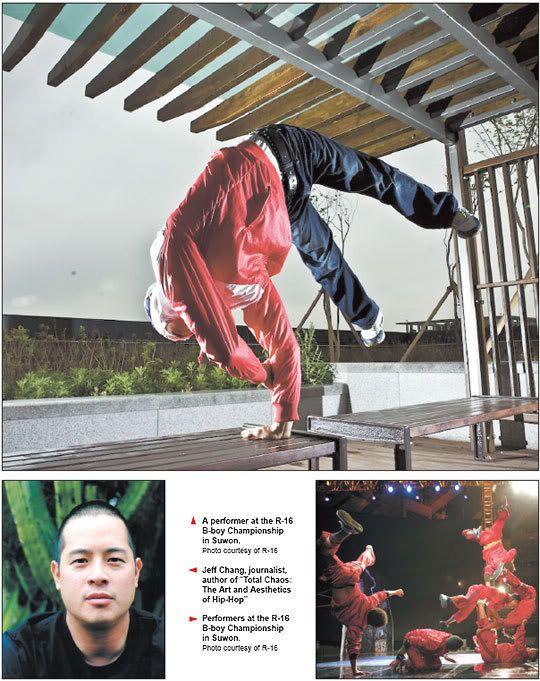[Regina Walton's Expat Interviews] Korea's trend-setting hip-hop culture
What I didn't realize when starting my interviews was the lag time between speaking with someone and getting it to print. I had the pleasure of speaking with Jeff Chang in early June at the R-16 b-boy dance competition. However, it's just making it to print today and it's almost two months later.
This interview is only around 600 words, so it's pretty short and leaves out some other things I asked Jeff about.
If I can figure it out, I'll post the rest of the interview as a podcast and I'll just update this post when I do it. Basically, what that means is I have no idea how to edit and upload at podcast. I've got to ask my pod casting friends, like ZenKimchi (who now does the weekly Seoul Podcast) or FeetManSeoul/Metropolitician how to do it.
In the meantime, check out the interview.
[Regina Walton's Expat Interviews] Korea's trend-setting hip-hop culture
Jeff Chang is a journalist and book writer whose writing focuses on hip-hop culture. He has written for many well-regarded publications, from the New York Times to Vibe magazine. He is the author of two books on hip-hop culture. His first was "Can't Stop, Won't Stop: A History of the Hip-Hop Generation." His second book, "Total Chaos: The Art and Aesthetics of Hip-Hop," is an anthology of essays and interviews. It focuses on the reach of hip-hop culture beyond its obvious elements of rapping or MCing; DJing; urban art and graffiti; and b-boying or break dancing. The book looks at how hip-hop culture has influenced other art forms like theater and film, fashion, photography, poetry, literature and painting.I had a chance to sit down and talk to Chang during the recent R-16 B-boy Championship in Suwon on May 31 and June 1 at the Suwon Olympic Sports Complex.
For expatriates in Korea who are interested in hip-hop and b-boy culture, Korea is a new center of innovation. That's very exciting. When asked why he was attending the R-16 competition, Chang replied at length. "R-16 is recognized, I think, as one of the top b-boy events in the world, and, I think, for good reason. The Korean b-boys have really been able to put themselves on the map in a huge way. They've completely changed the game as far as b-boying goes. They breathe all kinds of new life into the art form that I think folks have been looking for a long time.
"And, so, I think the excitement around R-16 in the world has to do with the fact that it just seems that this (Korea), right now, is the place to be if you want to know what's at the cutting edge of hip-hop and what's at the cutting edge of the dance forms. I think, for instance, in the United States over the last two years, there have been all these dance competitions that have been going on. There is this huge craze for dance and, at the same time, that's created a hunger for the real thing. And I think this is the epitome of the real thing."
With such kudos for the Korean b-boy teams from someone so established and well-versed in hip-hop culture, the question is what exactly sets the Korean teams apart from the other fiercely competitive b-boy teams worldwide? What is it that makes Korean b-boy teams worth paying attention to?
For Chang, what it comes down to is both mastery of basic elements and innovation.
"I think it's a combination of the fact that these are crews that are fiercely and intensely competitive. They have completely mastered the forms and they're also completely transforming the forms. I was starting this afternoon to compile a list of all these different types of moves that Korean b-boys have innovated over the last five years, and it's mind-boggling. There are so many. And not just that; it's the whole form.
"It's the whole choreography. It's the way that they present the shows. It's the way that they use the stage. It's the way they engage the audience. It's all that and that hardcore b-boy attitude of 'I'm the best' and then proving it. It (hip-hop) allows folks to stake out their own identity and to then make that identity available to folks all around the world. What the Korean b-boys are doing in that sense is they're making Korea visible and accessible to millions and millions of kids all around the world.
"It's always been a grass-roots movement that's been about allowing people to express themselves in the deepest kind of way."
Read more about Jeff Chang and his writing at www.cantstopwontstop.com and www.totalchaoshiphop.com
The R-16 website
My link to Jeff's article on Korean b-boys and R-16
Here is a Adobe version of the article:
What's also exciting about this one was Jeff has been a journalist and author writing on this stuff for years, which means just by speaking with him, I had a chance to learn. Also, Jeff knows Miles Marshall Lewis who is another respected journalist and writer. Miles found me via my blog maybe a year or so ago. Miles is black expat living in Paris right now, so it's great to be in touch. It was really fun to interview someone he knows and respects. Sphere: Related Content












No comments:
Post a Comment
Hey there! Thanks for visiting my blog. It's my first blog, and I'm glad folks are still stopping by even though I'm no longer living in South Korea. Feel free to comment. If you want a personal answer, leave your email, and I won't publish the comment. Nasty comments and spam links will not be tolerated.